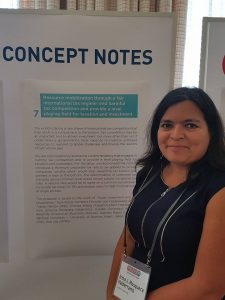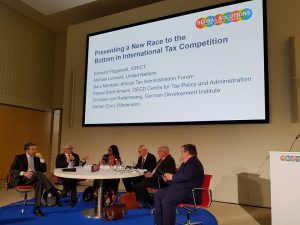The Argentinian Presidency of the G20 has engaged think thanks and leading experts (task forces) from around the world to provide valuable analysis to the G20 dialogue and produce ideas which contribute to the achievement of concrete and sustainable policies (T20 Argentina ).
The first meeting of the T20 took place in February at the Inception Workshop in February in Buenos Aires (Argentina). Another meeting is taking place at the end of May at the Global Solutions Summit in Berlin (Germany) and a final meeting will take place in September in Buenos Aires (Argentina). The full text of the policy briefs is available online.
The task force dealing with taxation combines trade, investment and tax cooperation. As stated in the T20 website “This Task Force will examine how to encourage a rules-based multilateral trade system that broadens the benefits of economic integration while providing the tools to protect those that are hurt by globalization. It will also provide policy recommendations to further advance the international G20 tax agenda”.
One of the topics addressed in 2018 by this task force is tax competition. For the research project GLOBTAXGOV that aims to investigate international tax law making by the OECD, G20 and EU, this task force was a good opportunity to explore ideas of tax competition and global tax governance.
In the policy brief on tax competition, it was highlighted the differences in the implementation of BEPS that lead to undesired forms of tax competition. Some of these differences have been highlighted in the past in a comparative research on the implementation of BEPS 4 Minimum Standards in Asia, Africa, and Latin America. See Mosquera Valderrama I.J. Output Legitimacy Deficits and the Inclusive Framework of the OECD/G20 Base Erosion and Profit Shifting Initiative.
In the said article, the analysis of the implementation of BEPS demonstrated that a one-size-fits all approach does not work. Consequently, the OECD and the BEPS Inclusive Framework should consider the differences between countries, which may result in a different implementation of the BEPS four minimum standards. This article also calls “for tailored solutions for developing countries, which should include a regional approach due to the different needs of African English-speaking countries, African French-speaking Countries, Latin American and Caribbean countries, and Central and Eastern European countries. The lack of regional tax coordination has been addressed by Asian countries, which are very concerned regarding the differences among the countries in the region and their different needs. This concern also applies to countries in Africa, and in Central America and Latin America. As a result, the OECD/G20 BEPS initiative should be tailored to the needs of developing countries and more specific to the countries in these regions”.
Following this research, we submitted in the policy brief that there are distortions in tax competition created by the differences in implementation of BEPS. We argue that balancing competition and BEPS implementation is needed to achieve a global model of tax governance in which developed and developing countries compete on a level playing field. This new model is based on experimental theories of governance. These experimental theories will result in a framework of goal-setting and the revision through comparative review of implementation experience in diverse local (country) contexts, which will be adapted to the OECD and the G20 roles in global tax governance.
Therefore, in the policy brief on tax competition we “ask the G20 leaders to promote regional cooperation in the implementation of international standards, including BEPS. The G20 should facilitate the creation of regional (or, for that matter, sub-regional) peer review and consultancy mechanisms that would allow countries to set and revise their own goals and targets for implementation, getting regular feedback from neighboring countries”. The full text of the policy brief is available online and also in this blog.G20 Policy brief Tax Competition
 The policy brief was discussed at the Global Solutions Summit in a panel with Michael Lennard UN, Nara Monkam ATAF, Pascal Saint-Amans OECD and Edmund Fitzgerald ICRICT. Therefore, the content of the policy brief and the recommendations have received the attention by international and regional organizations and by think-tanks.
The policy brief was discussed at the Global Solutions Summit in a panel with Michael Lennard UN, Nara Monkam ATAF, Pascal Saint-Amans OECD and Edmund Fitzgerald ICRICT. Therefore, the content of the policy brief and the recommendations have received the attention by international and regional organizations and by think-tanks.
To sum up in order to solve the tensions originated from the setting of international tax standards by the OECD and G20, in the tax competition policy brief a new model of global tax governance is proposed. For this, we need experts in political science, taxation, international relations and international political economy. Let’s discuss global tax governance!!

